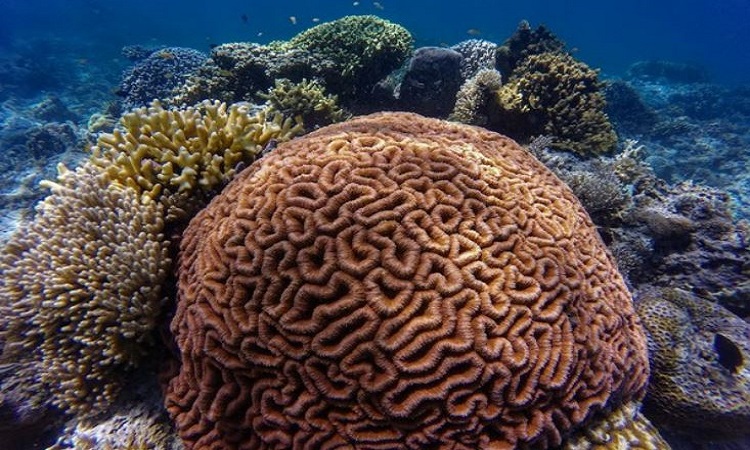
Washington: A three-year study in the South Pacific has found evidence that ocean warming can trigger outbreaks of "dinoflagellate-infecting RNA viruses" that attack symbiotic algae inside corals. Coral reef viruses have gained greater attention since being implicated in 2021 as a possible cause of stony coral tissue loss disease that has decimated Florida and Caribbean reefs for almost a decade.
The breathtaking colours of reef-building corals come from photosynthetic algae that live inside the corals. A groundbreaking three-year study has found that viruses may increase their attacks on these symbiotic algae during marine heat waves.
Few studies have examined how heat and other forms of stress affect coral virus outbreaks, and fewer still have looked at the reef-scale dynamics of those outbreaks. The study published online today in ISME Communications does both. It is also the first study to analyze the reef wide prevalence, persistence, triggers and health impacts of "dinoflagellate-infecting RNA viruses" (dinoRNAVs), single-stranded RNA viruses that infect the symbiotic algae that live inside the corals.
Lead author Lauren Howe-Kerr said coral and marine disease researchers are paying closer attention to coral viruses in the wake of studies in October 2021 and February 2022 that found evidence suggesting viral infections of symbiotic dinoflagellates might be responsible for stony coral tissue loss disease (SCTLD). One of the deadliest coral diseases ever recorded, SCTLD has been decimating reefs in Florida and the Caribbean since it was first identified in 2014.
"While this study is not focused on SCLTD, it builds our understanding of coral viruses, and particularly RNA viruses that infect coral endosymbionts," said Howe-Kerr, a Rice postdoctoral researcher who co-authored the study with more than a dozen colleagues from Rice, Northeastern University, the University of Oregon, the University of the Virgin Islands, Rutgers University, Oregon State University, George Mason University, New Zealand's National Institute of Water and Atmospheric Research and the Mote Marine Laboratory's Coral Reef Research and Restoration Center in Summerland Key, Florida.
"Our work provides the first empirical evidence that exposure to high temperatures on the reef triggers dinoRNAV infections within coral colonies, and we showed those infections are intensified in unhealthy coral colonies," Howe-Kerr said.
The study was carried out at the Moorea Coral Reef Long-term Ecological Research station on the Pacific Ocean island of Moorea in French Polynesia. Moorea, which is about 20 miles from Tahiti, is ringed by coral reefs. Samples from 54 coral colonies around the island were collected twice a year between August 2018 and October 2020. The warmest water temperatures during that span were in March 2019. Reefs across the island suffered heat-related stress during this period, including widespread bleaching.
The study sites were located in a variety of reef zones that were subject to different kinds of environmental stress. For example, ocean-facing forereefs are deeper, with cooler and more consistent water temperatures, while near-shore fringing reefs in lagoons are subjected to the highest temperatures and greatest temperature variability.
Howe-Kerr earned her doctorate from Rice in 2022 and recently finished a yearlong Ocean Policy Fellowship at the National Science Foundation. The sampling and analysis were carried out during her doctoral studies in the Rice lab of marine biologist and study co-author Adrienne Correa.
"It was a huge team effort to go out and locate and sample the exact same coral colonies two times a year over this three-year period," Correa said, adding, "That was further complicated by the pandemic, which prevented us from sampling in March 2020, but in the end, it was all worth it. We learned a great deal about reef-wide viral dynamics."
Correa said it was clear from previous studies that corals "harbour lots of diverse viruses," but it wasn't known how specific viral types were distributed across a reef. A 2022 study from her group that was lead-authored by another former student, Carsten Grupstra, had detailed findings from tank-based experiments that showed viral activity of a single viral group -- dinoRNAVs -- in corals increased under heat stress.
"This three-year study builds off that and shows it can also happen in the ocean," Correa said, adding, "We saw the same kind of heat-induced increases in viral production across reefs." (ANI)







